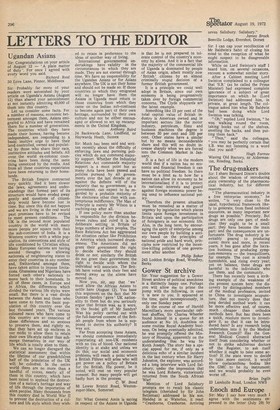The drug-makers
Sir: I share Bernard Dixon's doubts about the wisdom of introducing state ownership of the pharmaceutical industry, but for different reasons.
"The pharmaceutical industry in a free enterprise economy," he writes, "is very close to the ideal, hypothetical framework likely to generate, from fixed technical resources, as many important new drugs as possible." Precisely. But drugs are only one part of medicine: they ought to be a small part: they have become the main part: and the consequences are unfortunate. The drug industry is inevitably geared to producing cures; more and more, in recent years, it has gone after the lucrative business of producing symptom-removers — the tranquillisers, for example. The cost is already formidable, and rising every year; yet on balance, these drugs are harmful to the individuals who use them, and the community.
There has recently been a striking example of the weakness of the present system here: the discovery by distinguished members of the medical profession, invited to China to investigate acupuncture, that not merely does that long derided method work: it can be more effective and, of course, much cheaper than orthodox methods here. But has there been a quick, resolute move to investigate it, so that it can be introduced here? Is any research being undertaken into it by the Medical Research Council? Has the General Medical Council abstracted itself from considering whether or not to strike adulterous doctors off the Register, to ask itself whether it ought to take some action? If the state were to decide to take more control, it would allow coelacanthine bodies like the GMC to be its instrument; and we would probably be even worse off.
Brian Inglis 23 Lambolle Road, London NW3
































 Previous page
Previous page